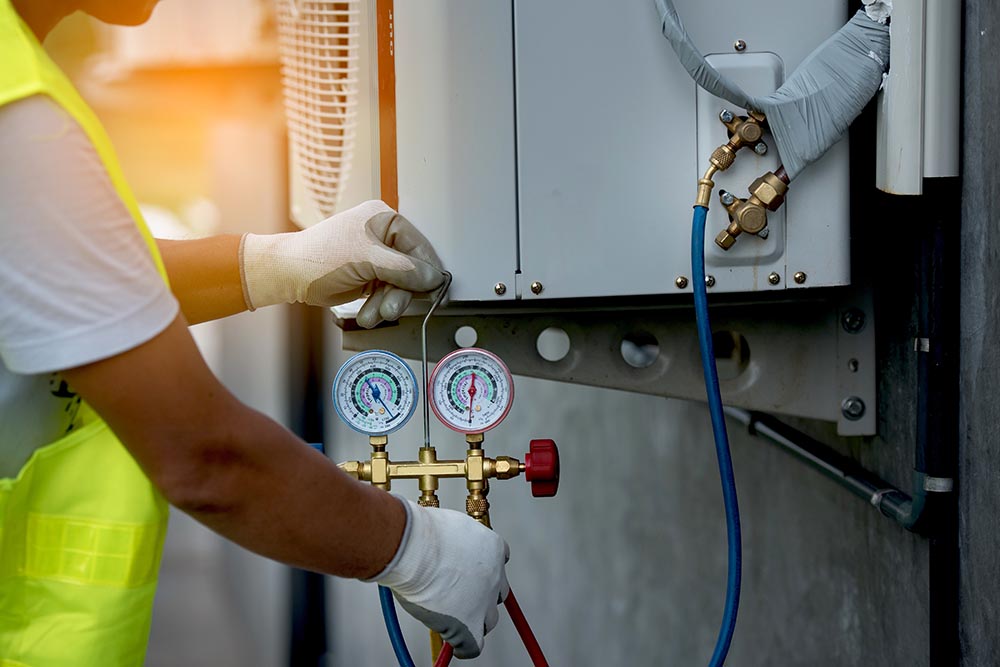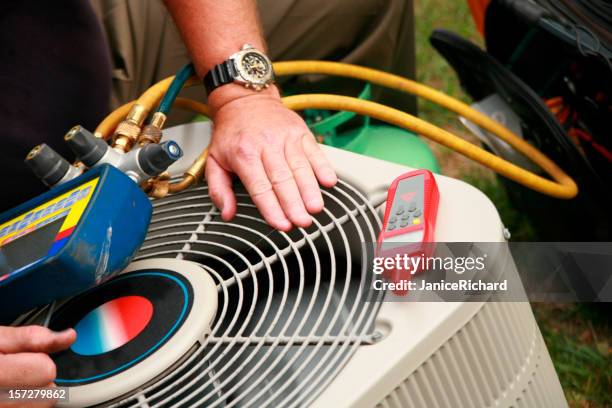Is a furnace replacement Worth It?
Is a furnace replacement Worth It?
Blog Article
Selecting Between a Warmth Pump and Heater: Key Factors To Consider for Your HVAC Needs
When examining heating alternatives for a/c needs, the choice between a heat pump and a furnace can be complex. Each system uses distinct advantages customized to details climates and power performance objectives. Understanding these differences is vital for making an enlightened selection. Secret elements such as installation costs and ecological influence further complicate the choice procedure. Which option absolutely straightens with one's comfort and sustainability choices? The complying with areas will certainly check out these factors to consider in detail.
Recognizing Warm Pumps: Exactly How They Function and Their Benefits
While lots of home owners think about different home heating choices, understanding how heatpump feature and their benefits can considerably influence their decision. Warm pumps operate by moving heat as opposed to creating it. In the winter months, they remove warmth from the outdoors air or ground and transfer it indoors, while in the summertime, they reverse this procedure, cooling the home by eliminating heat outside. This double performance makes them functional for year-round environment control.One of the primary benefits of heatpump is their power efficiency. They make use of substantially less electrical energy compared to conventional heating unit, potentially resulting in lower utility costs (ductless mini splits). In addition, heatpump have a smaller carbon impact, making them an eco pleasant selection. They likewise require much less upkeep than traditional systems, adding to long-lasting expense financial savings. In general, comprehending the technicians and benefits of heatpump can help homeowners make informed decisions regarding their heating and cooling demands
Exploring Heating Systems: Types, Operation, and Advantages
Heating systems are available in different kinds, including gas, electrical, and oil designs, each with distinct operational systems. Recognizing these distinctions is vital, as they affect efficiency and home heating performance. Additionally, heating systems use many advantages, such as consistent warm outcome and dependability in cooler climates.
Kinds of Heaters
Heater can differ significantly in layout and operation, with furnaces being a preferred choice among home owners. There are numerous sorts of heating systems, each using different gas sources and technologies. Gas heaters prevail, leveraging all-natural gas to generate warmth efficiently. Electric heating systems, on the other hand, make use of electrical resistance to create heat, frequently preferred for their straightforward setup. Oil heating systems, while much less usual, work in locations with minimal gas gain access to (ductless mini splits). Furthermore, condensing furnaces make best use of energy effectiveness by reusing and catching exhaust gases. Each kind runs with a system of warm exchangers and ductwork to disperse cozy air throughout a home. Understanding the differences between these heater kinds is vital for educated cooling and heating decisions
Advantages of Heating systems
For homeowners looking for trustworthy heat throughout cold months, the benefits of heaters are considerable. Furnaces supply constant heating, guaranteeing even temperature levels throughout the home. They are specifically efficient in severe chilly, usually outperforming warmth pumps in icy problems. Various types, including gas, electrical, and oil heating systems, offer versatility to meet varied demands and preferences.Furnaces likewise often tend to have lower first installment prices contrasted to warmth pumps, making them an extra available alternative for numerous. Their durable style adds to a longer life expectancy, with several devices lasting over 15 years with appropriate maintenance. In addition, modern-day furnaces are usually furnished with innovative modern technology for improved performance, which can result in reduced energy costs. In general, heaters stay a reliable option for efficient home heating.

Power Effectiveness: Comparing Warmth Pumps and Furnaces
When contrasting energy effectiveness in between warmth pumps and furnaces, the Seasonal Power Effectiveness Proportion (SEER) plays a vital role in identifying performance. Additionally, a functional price evaluation exposes the long-term financial ramifications of each system. Recognizing these aspects can assist home owners in making notified choices about their home heating services.
Seasonal Power Performance Ratio
Power effectiveness plays an essential duty in the decision-making process between warm pumps and heating systems, particularly when taking into consideration the Seasonal Power Effectiveness Ratio (SEER) This statistics measures the cooling performance of heatpump over a whole cooling period, providing a standard means to review efficiency. Greater SEER rankings show better energy efficiency, converting to lower energy consumption and minimized energy bills. In comparison, furnaces are normally analyzed using the Annual Fuel Application Performance (AFUE) score, which shows home heating performance. When comparing these two systems, house owners need to prioritize SEER scores for warm pumps, as they directly impact total power financial savings and ecological sustainability. A comprehensive understanding of SEER can notably influence the lasting contentment and cost-effectiveness of the chosen HVAC solution.
Functional Expense Analysis
Understanding the operational costs associated with heatpump and heaters is important for homeowners reviewing their alternatives. Warmth pumps commonly offer higher power effectiveness, converting electric energy right into warmth with very little waste. This causes reduced regular monthly utility expenses, specifically in modest environments. On the other hand, standard furnaces, especially gas designs, might have reduced upfront expenses however can sustain higher operational costs with time because of sustain prices and efficiency ratings.Moreover, heatpump can operate as both home heating and cooling down systems, potentially minimizing the demand for separate heating and cooling units. While preliminary financial investments for warmth pumps might be greater, their long-lasting cost savings in energy effectiveness can make them an extra economical choice for several households. Mindful analysis of regional energy rates is vital to figure out the ideal choice.
Setup Prices: What to Expect for every Heater
Installment expenses for heating unit can differ substantially between heat pumps and heaters, influencing house owners' choices. Heatpump generally have greater in advance installation expenses, usually ranging from $3,500 to $8,000, depending upon the device dimension and intricacy of installment. This consists of the outside device, indoor handling system, and needed ductwork modifications. Alternatively, furnaces have a tendency to have lower preliminary expenses, averaging between $2,500 and $6,000, which can be appealing for budget-conscious property owners. Installment costs can increase if substantial ductwork is required.Moreover, the choice of fuel type for heaters-- natural gas, lp, or electrical-- can also impact installment costs. While warmth pumps provide power efficiency, their initial financial investment may deter some purchasers. Inevitably, evaluating installment costs along with long-lasting cost savings and effectiveness will certainly help home owners in making educated decisions regarding their heater.
Environment Factors To Consider: Which System Carries Out Much Better in Your Area
How do environment conditions affect the effectiveness of heater? The efficiency of heatpump and heaters can vary significantly relying on the local climate. In modest environments, heatpump succeed by successfully transferring warmth from the outdoors air, making them an energy-saving alternative. Their effectiveness decreases in incredibly cold temperature levels, where they may battle to extract sufficient heat. On the other hand, furnaces, specifically gas designs, provide reliable and regular heat regardless of outside conditions, making them more suitable in colder regions.In areas that experience milder winter seasons, warmth pumps can operate properly year-round, supplying both home heating and cooling. On the other hand, areas with rough winters months commonly take advantage of the effectiveness of heating systems. Ultimately, comprehending the neighborhood climate is essential when choosing in between a heat pump and a heater, as it directly affects their functional performance and overall efficiency.
Maintenance Demands: Long-Term Take Care Of Warmth Pumps vs. Furnaces
While both warm pumps and heaters call for regular upkeep to assure peak efficiency, their certain needs and care routines vary significantly. Furnaces generally need less frequent focus, with yearly assessments sufficing to look for gas leaks, tidy filters, and assess general functionality. Their simpler design typically Find Out More permits simple repairs.In contrast, heatpump necessitate biannual upkeep because of their twin duty in heating & cooling. This consists of cleaning coils, inspecting refrigerant Click This Link levels, and making certain that both the exterior and indoor systems operate at their best. Additionally, heatpump upkeep frequently entails more elaborate parts, making specialist servicing essential.Neglecting upkeep can result in reduced efficiency and boosted energy expenses for both systems. Ultimately, homeowners should think about these lasting care needs when picking between a heat pump and a furnace, as positive upkeep can prolong the life expectancy and efficiency of either system significantly.
Ecological Influence: Selecting a Lasting Heating Choice
The ecological impact of heating unit is an essential assessment for house owners seeking sustainable choices. Heatpump are normally much more energy-efficient than standard heating systems, as they move warm rather than produce it, substantially decreasing carbon discharges. By using sustainable power resources, such as geothermal or air-source heatpump, house owners can better lessen their environmental footprint.On the other hand, gas heating systems emit greenhouse gases and add to air contamination, though they typically give higher warmth result. Developments in innovation have led to the growth of high-efficiency furnaces that decrease emissions.Ultimately, picking a home heating system includes evaluating efficiency versus ecological impact. Home owners are encouraged to assess neighborhood energy resources and motivations for eco-friendly systems, ensuring a selection that lines up with both individual comfort and ecological obligation. The decision impacts not just immediate convenience but also long-term sustainability and ecological health and wellness.
Frequently Asked Inquiries
How Lengthy Do Heat Pumps and Furnaces Generally Last?
The lifespan of heatpump commonly varies from 15 to 20 years, while heating systems can last between 15 to three decades. Routine upkeep significantly impacts their longevity and effectiveness in giving heating remedies.
Can I Utilize a Warmth Pump in Incredibly Cold Climates?
Heatpump can operate in very cool environments, but their performance decreases as temperatures decrease. In such problems, supplemental home heating resources may be essential to maintain comfy indoor temperature levels and assure peak efficiency.

What Is the Noise Degree of Heat Pumps Versus Furnaces?
The noise degrees of heatpump and furnaces differ considerably. Generally, warmth pumps run more quietly than standard furnaces, making them more effective for those delicate to sound, while heating systems may produce louder functional sounds throughout home heating cycles.
Are Heat Pumps Suitable for Both Home Heating and Cooling?
Warmth pumps are indeed suitable for both heating & cooling (furnace replacement). They operate by moving warm, supplying efficient temperature control year-round, making them a functional choice for homeowners seeking an all-in-one a/c service
What Dimension Furnace Do I Need for My Home?
Identifying the appropriate size heating system for a home requires reviewing elements such as square video, insulation high quality, neighborhood climate, and the home's layout. Consulting an expert can ensure a precise assessment and perfect convenience. Warmth pumps generally use greater power efficiency, transforming electrical power into warmth with very little waste. In modest environments, heat pumps succeed by effectively transferring warmth from the outdoors air, making them an energy-saving alternative. On the other hand, furnaces, particularly gas versions, supply reliable and regular warmth no matter of outdoor conditions, making them more suitable in colder regions.In locations that experience milder winters months, warmth pumps can run successfully year-round, giving both heating and air conditioning. Warm pumps are generally extra energy-efficient than traditional heating systems, as they move warm instead than produce it, greatly decreasing carbon exhausts. By utilizing eco-friendly power resources, such anchor as geothermal or air-source heat pumps, home owners can even more minimize their ecological footprint.On the other hand, natural gas heating systems release greenhouse gases and add to air contamination, though they frequently offer higher warmth output.
Report this page